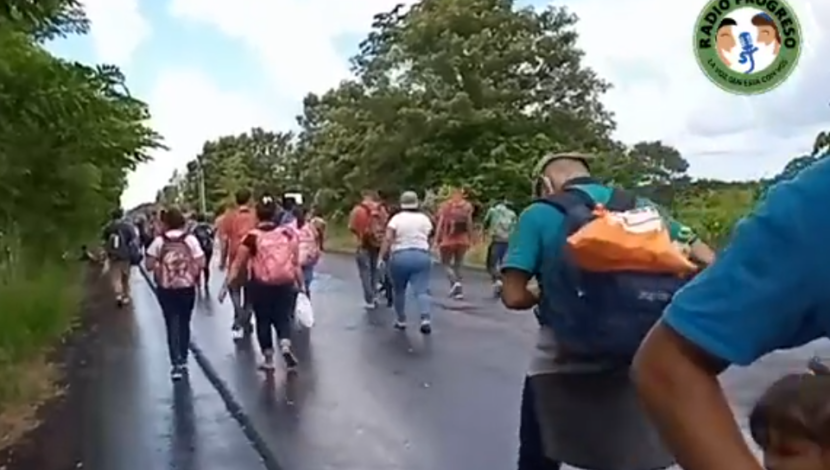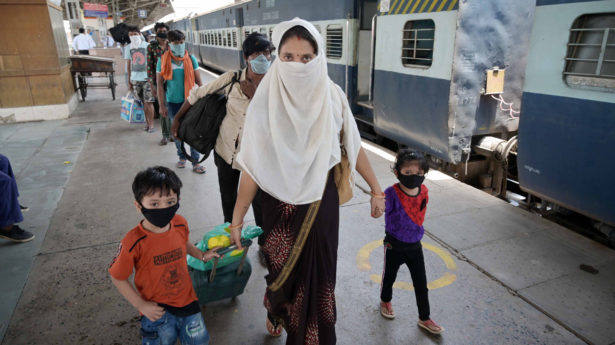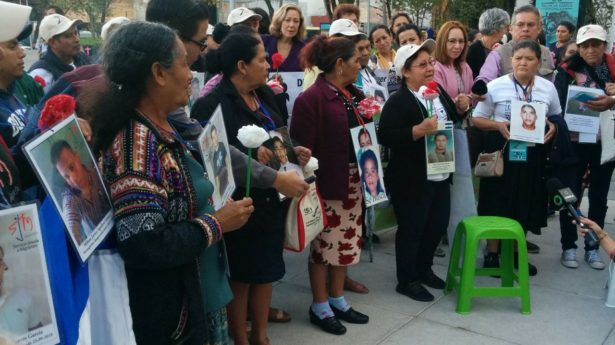The Unitarian Universalist Service Committee advances human rights through grassroots collaborations.
New Honduran Caravan Highlights Dangers, Inequities Along the Migrant Trail

By on October 15, 2020
On September 30, a group of approximately 2,000 people set out from San Pedro Sula, Honduras to escape deteriorating conditions across the country. The plan for many of them, as in previous caravans, was to travel on foot to Guatemala, then Mexico, and finally to the U.S. border.
UUSC partner Radio Progreso, an independent Honduran news outlet, accompanied part of the group, interviewing those walking along the highway in the department of Izabal in Guatemala. Amid oppressive humidity and daytime temperatures reaching 95 degrees, this group had been walking for hours on the open blacktop highway. Some shielded themselves with leafy branches against the punishing sun and intermittent rain showers.
The pandemic has significantly impacted peoples’ livelihoods. The already precarious economic situation in Honduras has turned dire. Despite this, the government continues a pattern of repression.
Feeling pressure from the United States, responses from Mexico and Guatemala have been forceful and highly militarized. Unlike the October-November 2018 caravan, which passed through Guatemala with ease—and was met with open arms and support from federal and local governments in Mexico—this time around, Mexico sent several hundred members of the army, marines, and Mexican National Guard to its southern border.
However, even before most of them could reach Mexico, they were met with significant force from Guatemala, whose response was so strong that most people were eventually turned back at the border, and reports indicate that only around 200 people made it into southern Mexico where they were apprehended by Mexican migration authorities.
Sister Lidia Mara Silva de Souza, director of UUSC partner the Scalabrinianas Migrant and Refugee Mission in Mexico City, said that Mexico’s policy is, “not to receive anyone, not to let them in, so that the government won’t have to attend to them.” Indeed, she said, Mexico didn´t prepare to provide humanitarian support because they knew that Guatemala would turn them back. This regional cooperation—dictated by pressure from the United States—makes it seem like countries in the region, according to de Souza, “come to an agreement on who is going to be the bad guy—this time it was Guatemala, last time it was Mexico.”
A joint statement signed onto by a broad coalition of civil society organizations in Central America and Mexico, including UUSC partners Asylum Access Mexico, FM4 Paso Libre, Asociación Pop No’j, Fundación para la Justicia y el Estado Democrático de Derecho, and Radio Progreso’s sister organization the Jesuit research and communication group ERIC, expressed deep concern over both the militarized responses as well as state discourses that criminalize and stigmatize people in migration: “Punitive regional policies of containment and criminalization only make the humanitarian crisis in migration and asylum worse, instead of promoting policies of shared responsibility that attack the structural causes of migration and appropriately protecting people from the risks of the COVID-19 pandemic.”
The disregard for human rights was made evident when the President of Guatemala, Alejandro Giammattei, removed personnel from the United Nations High Commissioner for Refugees from the country for supposedly, “hindering the state of emergency” that had been declared earlier. “We didn´t have a group of refugees, we had a caravan of people that violently forced their way into the country,” he said.
President Giammattei’s words dismiss the legitimate needs for international protection among those in the caravan and echo the criminalization rhetoric from the United States. Further, as evidenced by the bombshell Senate Foreign Relations Committee report released on October 13, ongoing U.S. influence on regional migration policies has gone much further than mere discourse or economic pressure.
The pandemic has provided the perfect excuse to further paint international migration as a national security threat that necessitates closed borders and heavily militarized responses. However, without addressing the root causes, what does this mean for people who do not have a home to return to, who have no opportunities to support their families, and who fear for their safety? The reality is that they will face:
- Greater risk for violence at the hands of militarized forces who are not trained in humanitarian response and whose directives are containment, not assistance.
- More vulnerability to organized crime that fills the void left by the state and sees migrants as easy prey and easy profit. People in migration are already among the most vulnerable to human trafficking, kidnapping, rape, and extortion.
- Increased stigmatization as they become the focus of national discourses that cast them as criminals and disease carriers.
The COVID-19 pandemic has laid bare profound structural inequalities in Central America and across the world. As the pressures forcing people out of their homes to seek safety elsewhere continue to mount, UUSC condemns the militarized and anti-humanitarian policies of the United States government. We reiterate our commitment to supporting all people in migration and our partners who are working tirelessly every day to accompany their journeys and defend their rights to safety and dignity along the way.
***
About UUSC: Guided by the belief that all people have inherent worth and dignity, UUSC advances human rights globally by partnering with affected communities who are confronting injustice, mobilizing to challenge oppressive systems, and inspiring and sustaining spiritually grounded activism for justice. We invite you to join us in this journey toward realizing a better future!
Photo Credit: Radio Progreso Facebook Video

